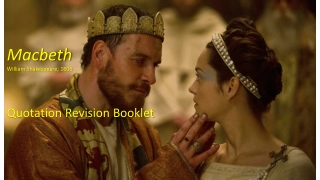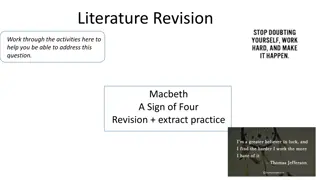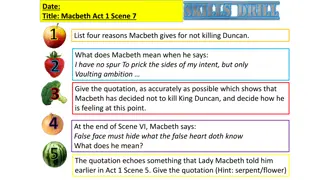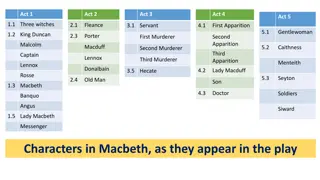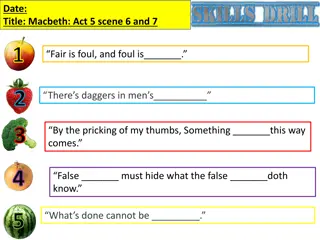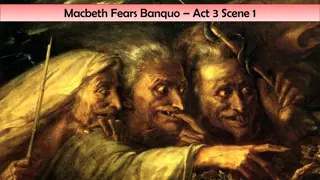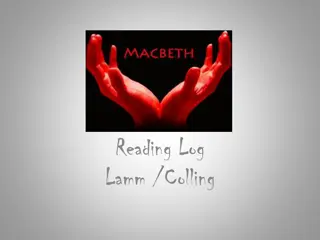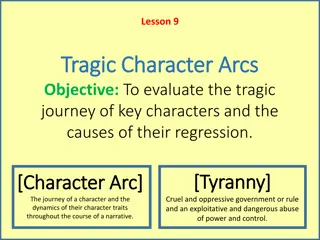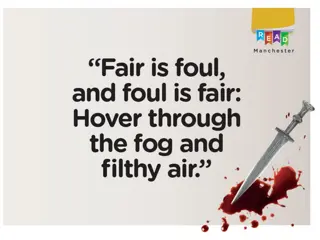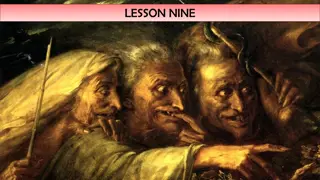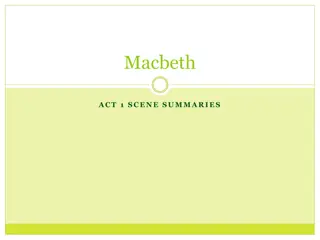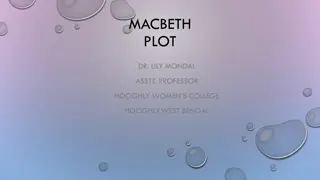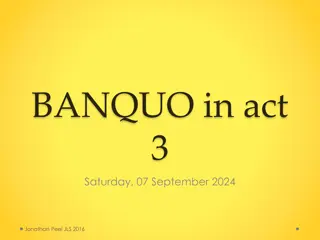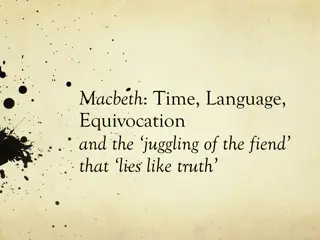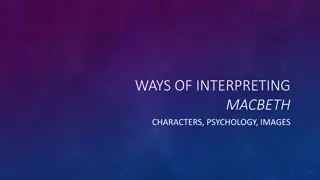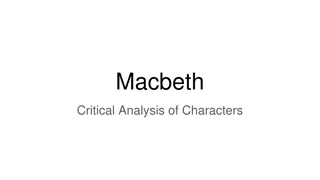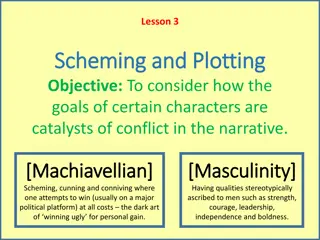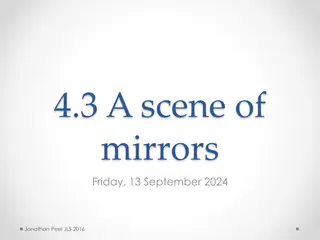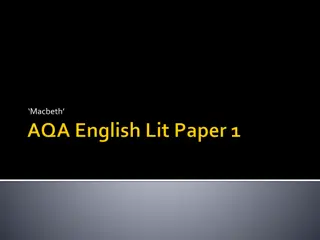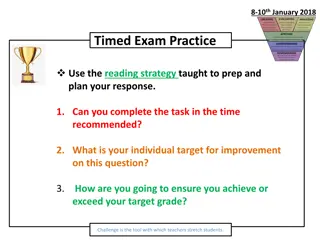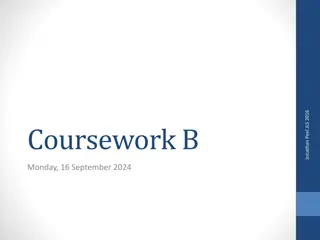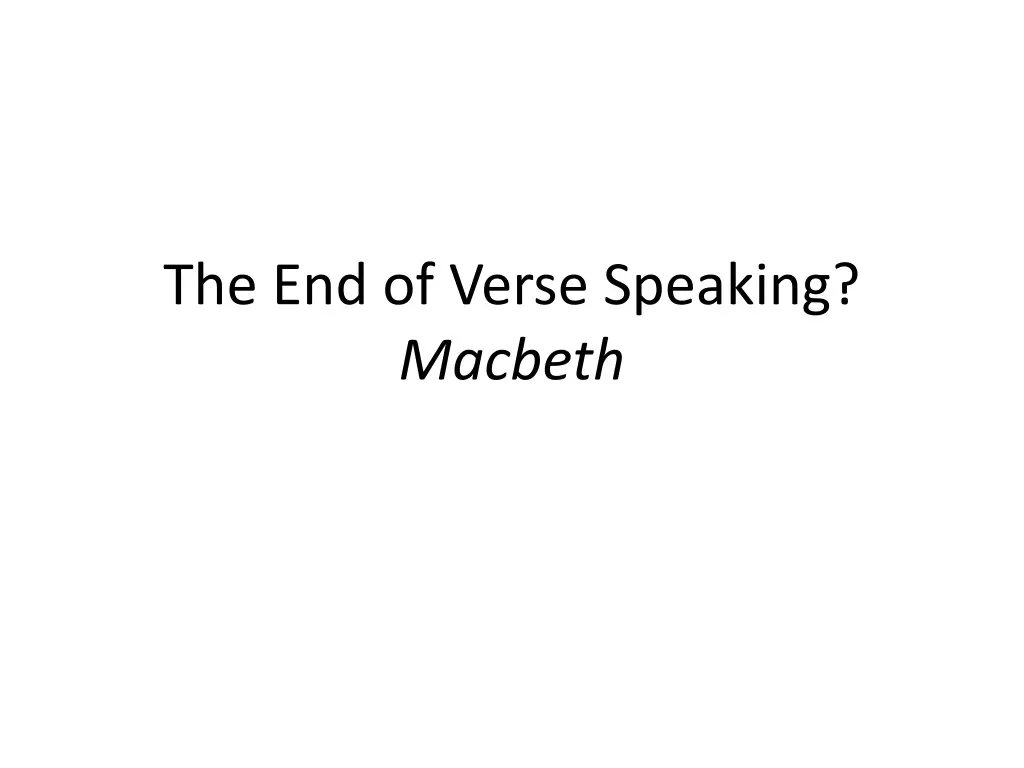
Macbeth: Shared Verse Lines and Character Dialogues
Explore shared verse lines and poignant dialogues from Shakespeare's "Macbeth". Dive into the inner thoughts and interactions of characters like Lady Macbeth, Macbeth, Banquo, King Duncan, and more, as they navigate themes of ambition, guilt, and betrayal. Witness the power of Shakespearean language in unraveling the dark and compelling narrative of this timeless tragedy.
Download Presentation

Please find below an Image/Link to download the presentation.
The content on the website is provided AS IS for your information and personal use only. It may not be sold, licensed, or shared on other websites without obtaining consent from the author. If you encounter any issues during the download, it is possible that the publisher has removed the file from their server.
You are allowed to download the files provided on this website for personal or commercial use, subject to the condition that they are used lawfully. All files are the property of their respective owners.
The content on the website is provided AS IS for your information and personal use only. It may not be sold, licensed, or shared on other websites without obtaining consent from the author.
E N D
Presentation Transcript
The End of Verse Speaking? Macbeth
Did you not speak? MACBETH LADY MACBETH MACBETH LADY MACBETH MACBETH Hark! who lies i th second chamber? LADY MACBETH MACBETH This is a sorry sight. LADY MACBETH To say a sorry sight. MACBETH There s one did laugh in s sleep. And one cried Murder that they did wake each other When? Now. As I descended? Ay. Donalbain. A foolish thought, (Nicholas Brooke ed. Macbeth, Oxford, 1990) Lady Macbeth: Did you not speak? Macbeth: Lady Macbeth: Macbeth: Lady Macbeth: Ay. Macbeth: Who lies i the second chamber? Lady Macbeth: Macbeth: This is a sorry sight. Lady Macbeth: A foolish thought, to say a sorry sight. I heard the owl-scream and the cricket s cry. When? Now. As I descended? Hark! Donalbain. [looks at his hands. (Cicely Berry, The Actor and his Text, 70)
SHARED VERSE LINES LINKING SINGLE SHORT LINES MACBETH Hath he asked for me? LADY MACBETH Know you not he has? (1.7.30) LINKING SINGLE SHORT LINES WITH A LONGER SPEECH MACBETH Methought I heard a voice cry Sleep no more, Macbeth does murder sleep the innocent sleep, Sleep that knits up the ravelled sleeve of care, The death of each day s life, sore labour s bath, Balm of hurt minds, great nature s second course, Chief nourisher in life s feast LADY MACBETH What do you mean? (2.2.33-38) LINKING TWO LONGER SPEECHES KING DUNCAN Nimbly and sweetly recommends itself Unto our gentle senses. BANQUO The temple-haunting martlet, does approve By his loved mansionry that the heavens breath Smells wooingly here. This castle hath a pleasant seat. The air This guest of summer, (1.6.1-6)
LADY MACBETH . . . I would, while it was smiling in my face, Have plucked my nipple from his boneless gums And dashed the brains out, had I so sworn As you have done to this. MACBETH If we should fail? LADY MACBETH But screw your courage to the sticking place And we ll not fail. We fail! (1.7.56-61) BANQUO . . . Fears and scruples shake us. In the great hand of God I stand, and thence Against the undivulged pretence I fight Of treasonous malice. MACDUFF ALL And so do I. So all. (2.4.125-8)
SHORT LINES Single Lady Macbeth Is Banquo gone from court? Servant. Ay Madam, but returns again tonight. (3.2.1-2) Final Macbeth Will all great Neptune s ocean wash this blood Clean from my hand? no: this my hand will rather The multitudinous seas incarnardine, Making the green one, red. [Enter Lady Macbeth.] Lady Macbeth My hands are of your colour: but I shame To wear a heart so white. . . . (2.2.58-63) Initial Macduff. Is thy Master stirring? Our knocking has awak'd him: here he comes. (2.3.41-2) Internal Art thou not fatal vision, sensible To feeling, as to sight? or art thou but A dagger of the mind, a false creation, Proceeding from the heat-oppressed brain? I see thee yet, in form as palpable, As this which now I draw. Thou marshall'st me the way that I was going, And such an instrument I was to use. (2.1.36-43)
King. Give me your hand: Conduct me to mine host we love him highly, And shall continue, our graces towards him. By your leave Hostess. [Exeunt] (1.6.28-31)
Macbeth We will speak further, Lady Macbeth To alter favor, ever is to fear: Leave all the rest to me. [ Exeunt.] Only look up clear: (1.5.70-72)
SHORT LINES Single Lady Macbeth Is Banquo gone from court? Servant. Ay Madam, but returns again tonight. (3.2.1-2) Final Macbeth Will all great Neptune s ocean wash this blood Clean from my hand? no: this my hand will rather The multitudinous seas incarnardine, Making the green one, red. [Enter Lady Macbeth.] Lady Macbeth My hands are of your colour: but I shame To wear a heart so white. . . . (2.2.58-63) Initial Macduff. Is thy Master stirring? Our knocking has awak'd him: here he comes. (2.3.41-2) Internal Art thou not fatal vision, sensible To feeling, as to sight? or art thou but A dagger of the mind, a false creation, Proceeding from the heat-oppressed brain? I see thee yet, in form as palpable, As this which now I draw. Thou marshall'st me the way that I was going, And such an instrument I was to use. (2.1.36-43)
Cap. For brave Macbeth (well he deserves that name) Disdaining Fortune, with his brandis d steel, Which smok'd with bloody execution (Like valour s minion) carv'd out his passage, Till he fac d the slave: Which ne'er shook hands, nor bad farewell to him, Till he unseam'd him from the nave to th' chops, And fix'd his head upon our battlements. . . . (1.2.16-23) Cap. So they doubly redoubled strokes upon the foe: Except they meant to bath in reeking wounds, Or memorize another Golgotha, I cannot tell: but I am faint, My gashes cry for help. (1.2.38-42)
O, I could prophesy, But that the earthy and cold hand of death Lies on my tongue. No, Percy, thou art dust, And food for Pr. For worms, brave Percy. Fare thee well great heart. (1H4, 5.4.82-6) Barnado. Last night of all, When yond same star that's westward from the pole Had made his course t'illume that part of heaven Where now it burns, Marcellus and myself, The bell then beating one Enter the Ghost in complete armour, holding a truncheon, with his beaver up Marcellus. Peace, break thee off. Look where it comes again. (Hamlet, 1.1.33-8)
Aposiopesis figure of silence - 'when we begin to speake a thing, and breake of in the middle way (Puttenham, 139) 'a forme of speech by which the Orator through some affection, as either of feare, anger, sorrow, bashfulnesse or such like, breaketh off his speech before it be all ended' (Peachum, 118).
Or memorize another Golgotha, I cannot tell But I am faint. My gashes cry for help. (1.1.40-42)
Lady Macbeth Great Glamis, worthy Cawdor, Greater then both, by the all-hail hereafter, Thy letters have transported me beyond This ignorant present, and I feel now The future in the instant. Macbeth. My dearest love, Duncan comes here to night. Lady Macbeth. And when goes hence? Macbeth. Tomorrow, as he purposes. Lady Macbeth. O never, Shall sun that morrow see. Your face, my Thane, is as a book, where men May read strange matters, to beguile the time. (1.5.52-61)
The future in the instant. Macbeth. My dearest love, Duncan comes here to night. Lady Macbeth. And when goes hence? Macbeth. Lady Macbeth. O never, shall sun that morrow see. Tomorrow, as he purposes. The future in the instant. Macbeth. My dearest love, Duncan comes here to night. Lady Macbeth. And when goes hence? Macbeth. Lady Macbeth. O never, shall sun that morrow see. Tomorrow, as he purposes. The future in the instant. Macbeth. My dearest love, Duncan comes here to night. Lady Macbeth. Macbeth. Tomorrow, as he purposes. Lady Macbeth. O never, shall sun that morrow see. And when goes hence? The future in the instant. Macbeth. My dearest love, Duncan comes here to night. Lady Macbeth. Macbeth. Tomorrow, as he purposes. Lady Macbeth. O never, Shall sun that morrow see. And when goes hence?
Lady Macbeth Great Glamis, worthy Cawdor, Greater then both, by the all-hail hereafter, Thy letters have transported me beyond This ignorant present, and I feel now The future in the instant. Macbeth. My dearest love, Duncan comes here to night. Lady Macbeth. And when goes hence? Macbeth. Tomorrow, as he purposes. Lady Macbeth. O never, Shall sun that morrow see. Your face, my Thane, is as a book, where men May read strange matters, to beguile the time. (1.5.52-61)
Shakespeares architecture in his verse is entirely dependent on the preservation of the iambic line (Peter Hall, Shakespeare s Advice to the Players, 24)
Always learn a text thought by thought, not line by line (Patsy Rodenburg, Speaking Shakespeare, 119)
George Puttenham, The Arte of English Poesie (London, 1589) Book 2, Chap. 4, 61-2. three maner of pauses . . . The shortest pause or intermission they called comma . . . The second they called colon . . . The third they called periodus .
Macb. . . . To morrow, and to morrow, and to morrow Creeps in this petty pace from day to day To the last syllable of recorded time: And all our yesterdays, have lighted fools The way to dusty death. Out, out, brief candle, Life's but a walking shadow, a poor Player That struts and frets his hour upon the stage And then is heard no more. It is a tale Told by an idiot, full of sound and fury Signifying nothing. (5.5.16-27)

